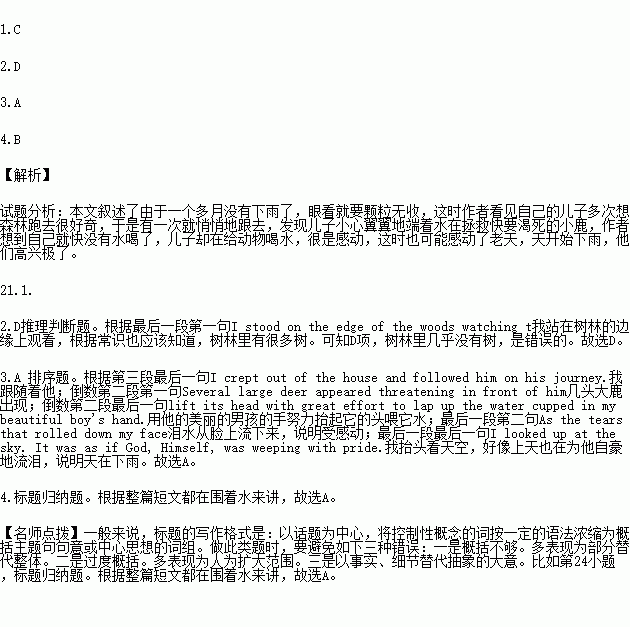题目内容
It was one of the hottest days of the dry season. We had not seen rain in almost a month. The crops were dying. Cows had stopped giving milk. The streams were long gone back into the earth. If we didn't see some rain soon we would lose everything.
I was in the kitchen making lunch for my husband and his brothers when I saw my six-year old son, Billy, walking toward the woods. He was obviously walking with a great effort... trying to be as still as possible. Minutes after he disappeared into the woods, he came running out again, toward the house.
Moments later, however, he was once again walking in that slow purposeful long step toward the woods. This activity went on for over an hour: walking cautiously to the woods, then running back to the house. Finally, my curiosity got the best of me. I crept out of the house and followed him on his journey.
He was cupping both hands in front of him as he walked; being very careful not to spill the water he held in them. Branches and thorns slapped his little face but he did not try to avoid them. He had a much greater purpose. As I leaned in to spy on him, I saw the most amazing site.
Several large deer appeared threatening in front of him. But Billy walked right up to them. I almost screamed for him to get away. And I saw a baby deer lying on the ground, obviously suffering from heavy loss of water and heat exhaustion, lift its head with great effort to lap up the water cupped in my beautiful boy's hand.
I stood on the edge of the woods watching the most beautiful heart I have ever known working so hard to save a life. As the tears that rolled down my face began to hit the ground, they were suddenly joined by other drops... and more drops... and more. I looked up at the sky. It was as if God, Himself, was weeping with pride.
1.Why did the author follow her son?
A. Because there might be danger.
B. Because her son was doing a good deed.
C. Because she was curious.
D. Because she intended to help.
2.Which of the following statements is Not True according to the passage?
A. Rain was in great need.
B. Billy carried water with his small hands.
C. Billy walked into the woods and then returned over and over again.
D. There were few trees in the woods.
3.Which is the correct order of the development of the story?
① The author was moved to tears.
② Billy fed the water to the baby deer.
③ Billy walked towards the large deer.
④ It began to rain.
⑤ The author followed Billy into the woods.
A. ⑤③②①④ B. ③②⑤①④
C. ④①③②⑤ D. ⑤②①③④
4. Which of the following is the best title for the passage?
A. Importance of water B. The water of life
C. How to save animals D. Animals in danger

